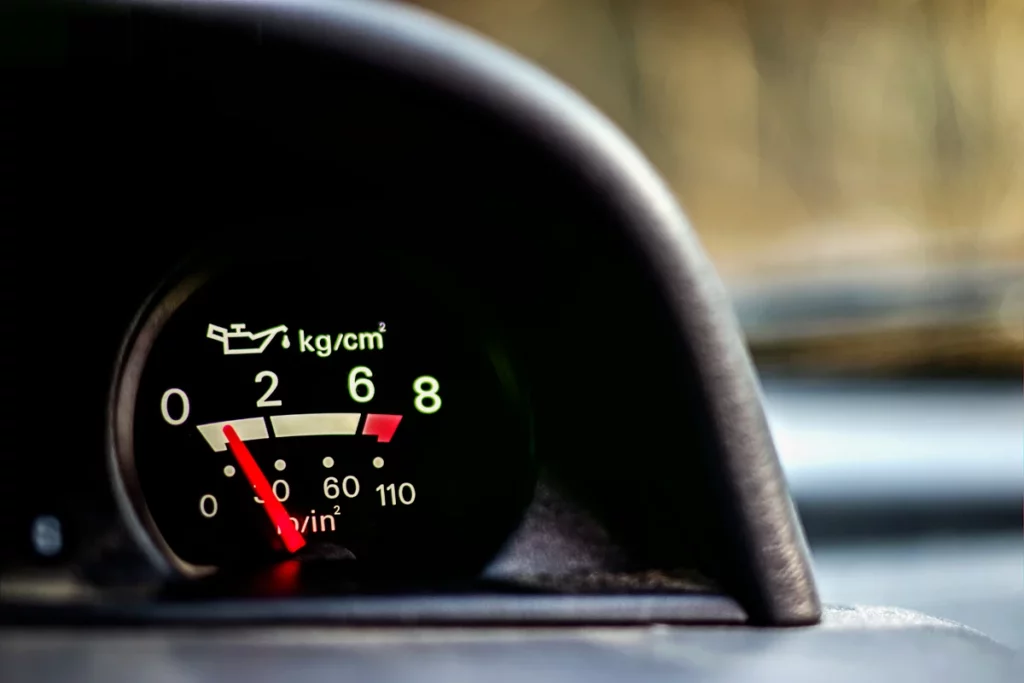Your oil pressure gauge is a very important component of your car because it allows you to see your engine health and check whether or not your engine is doing well enough.
That’s because a high oil pressure reading means that the oil isn’t circulating through all of the parts of the engine very well, and that can be problematic because you need your engine to be properly lubricated at all times.
Why does the oil pressure gauge go up when you accelerate?
That’s because the oil pressure inside the engine should naturally increase when the engine has to work harder for the vehicle to accelerate. However, if the increase is rather erratic, then there could be a problem.

Those who really don’t know their vehicles too well might end up worrying when their oil pressure gauge goes up whenever they are accelerating.
But the point here is that this is completely normal as the oil pressure naturally increases when the engine needs to work harder.
Then again, there are some instances where this might not seem like it’s normal, and that’s something that we might want to discuss here.
Related:
- How To Read Oil Pressure Gauge? (Easy Guide)
- 6 Reasons You Get Low Oil Pressure At Idle? (With Solutions)
- What Causes Oil Pressure Gauge Drops To Zero When Braking? (Explained)
Should your oil pressure gauge move while driving?
Car owners should very well know that the gauges that you can find on your dashboard have their own very important meanings when it comes to the overall health of the entire vehicle.
In that regard, not a lot of people truly understand what the oil pressure gauge is for as they might not think that it is as important as the other gauges.
Then again, the oil pressure gauge is just as important as any other gauge on the instrument cluster or dashboard.
The importance of the oil pressure gauge lies in the fact that you should always make sure that your car’s oil pressure is within a normal level and is not too high or too low.
That’s because oil pressure that tends to be too high or too low would mean that your engine oil isn’t going through all of the different parts of your engine well enough.
Of course, all of the parts of your engine need to be lubricated properly with clean oil because of the friction they go through on a regular basis while they are moving.
That said, those who keep their eyes regularly on the oil pressure gauge may wonder if it is actually normal for the car’s oil pressure to move so much while you are driving.
It can go up or go down depending on the behavior of your driving or on whether you are accelerating or decelerating.
For starters, it is completely normal for the oil pressure gauge to move whenever you are driving because the amount of oil pumped into the engine for it to work properly is directly proportional to how hard the engine works.
As such, the oil pressure will either increase or decrease depending on how hard your engine is working because oil is regularly pumped into the engine, which would thereby affect the oil pressure.
So, for those who don’t understand how the oil pressure gauge works, this is something that’s completely normal because how the engine needs to be regularly oiled while it is working so that the different parts and components inside the engine are lubricated properly.
The only important thing you need to keep in mind is that the oil pressure should be staying within normal levels, which means that it should neither be too high nor too low.
Why does my oil pressure gauge go up when I accelerate?
While we did say that the oil pressure gauge normally moves whenever you are driving because of how the oil pressure should change depending on how you are driving and the speed of your car, one of the things you might be wondering about is why the oil pressure gauge tends to go up when you accelerate.
So, again, it is perfectly normal for the oil pressure gauge to move whenever you are driving as there is a direct relationship between your oil pressure and the speed of your car.
As such, when you are driving faster such as when your car is accelerating, your engine needs to work harder for the entire vehicle to increase its speed.
You will be able to see that your engine is working harder when you look at the tachometer of your vehicle. The tachometer is responsible for keeping track of the RPM of your engine such that a higher RPMS mean that the engine is working harder.
This is usually the case when your engine is accelerating as it is perfectly normal for a car’s tachometer to give off higher readings.
Going back to the oil pressure gauge, whenever your engine or your motor spins faster such that the tachometer has a higher RPM reading, that means that the fuel pump would also need to spin faster so that the engine would have enough oil so different components need to be properly lubricated.
As such, when your fuel pump is spinning faster, this means that the oil pressure should be higher.
Of course, when the oil pressure in your engine is higher, your oil pressure gauge should naturally give off a higher reading as well.
This essentially answers the question as to why the oil pressure gauge goes up whenever you are accelerating or going faster.
However, there are some instances where some oil pressure gauges are not as accurate as they should be such as when the increase or decrease in the oil pressure is actually erratic or when your car is actually reaching a point where the oil pressure is beyond normal and is reaching high levels.
So, why is this happening?
If the increase in the oil pressure gauge is no longer normal such as when the oil pressure is unusually high when you are accelerating, here are some of the common reasons:
1. The oil filter is dirty or contaminated
The oil filter is there to make sure that the impurities in your engine oil are filtered out.
However, if the filter is dirty or contaminated, it would make it more difficult for it to filter out the impurities.
As such, the impurities may end up clogging and would make it more difficult for the engine to have a good enough supply of oil for proper lubrication.
2. Blocked passages
In the same way, when the oil is not filtered properly, some of the impurities may end up blocking the passages where the oil should pass through to make it all the way to the other components of the engine.
So, when the oil can’t reach the other components of the engine and gets stuck in one place, the oil pressure would increase to abnormal levels.
3. Oil quality
If the oil that you use for your engine is thicker, then it will naturally face more resistance when trying to make its way through your engine.
As such, the thicker or the higher the viscosity is, the oil pressure would also be higher.
4. Faulty oil pressure gauge
Finally, when your oil pressure gauge is showing a higher than normal oil pressure reading, this could also mean that the oil pressure gauge itself is faulty but your engine’s oil pressure is actually within normal levels.
It’s just that the oil pressure gauge is not accurate enough that it was able to show a normal reading.
How to fix my oil pressure gauge going crazy?
If you are thinking that your oil pressure gauge might be going crazy or is probably faulty, here are some of the symptoms you need to look at:
- The oil pressure gauge totally stops working properly such that it isn’t even showing the right oil pressure or if the changes in the oil pressure seem to be quite erratic.
- When the reading is too low even if you know for a fact that the engine is fine, this could be due to the oil pressure gauge. Or probably it could just be due to the cold weather as the weather can affect the reading of the gauge. But, in the absence of external factors, the oil pressure gauge might be faulty.
- If the oil pressure gauge seems to be too high such as when it reaches 80 PSI while you are driving even if you are not even driving at higher RPMs.
In such instances, the only way for you to be certain is to have a mechanic check your oil pressure gauge to see if it’s working properly. And if it’s not working properly, only the mechanic would be able to find a good fix for it.
In most cases, the mechanic would probably recommend that you replace the entire gauge and get a new one instead of actually fixing the old oil pressure gauge.
Sources
How a car works: How an oil pressure gauge works
Rymax Lubricants: What is high oil pressure and how to solve it
Your Mechanic: Oil pressure gauge goes up when accelerating
Find Any Answers: Is it normal for oil pressure to rise when you accelerate



